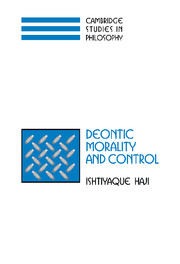Book contents
- Frontmatter
- Contents
- Acknowledgments
- 1 Introduction
- PART ONE DETERMINISM AND DEONTIC MORALITY
- 2 Obligation and Control
- 3 Frankfurt-Type Cases and Deontic Control
- 4 Control Requirements of Deontic Anchors: Some Objections
- 5 Determinism and Deontic Anchors
- PART TWO INDETERMINISM AND DEONTIC MORALITY
- PART THREE CONSEQUENCES OF BEING DEPRIVED OF DEONTIC ANCHORS
- Notes
- Glossary and List of Principles
- References
- Index
3 - Frankfurt-Type Cases and Deontic Control
Published online by Cambridge University Press: 23 July 2009
- Frontmatter
- Contents
- Acknowledgments
- 1 Introduction
- PART ONE DETERMINISM AND DEONTIC MORALITY
- 2 Obligation and Control
- 3 Frankfurt-Type Cases and Deontic Control
- 4 Control Requirements of Deontic Anchors: Some Objections
- 5 Determinism and Deontic Anchors
- PART TWO INDETERMINISM AND DEONTIC MORALITY
- PART THREE CONSEQUENCES OF BEING DEPRIVED OF DEONTIC ANCHORS
- Notes
- Glossary and List of Principles
- References
- Index
Summary
In a seminal paper, Harry Frankfurt advanced the now famous “Frankfurt-type example” primarily to argue against the Principle of Alternative Possibilities (PAP). The principle, which purports to specify the sort of freedom or control required for moral responsibility, is formulated by Frankfurt as follows:
PAP: A person is morally responsible for what he has done only if he could have done otherwise (Frankfurt 1969: 829).
In addition to revealing the lessons that they do about responsibility, Frankfurt-type examples are especially useful in probing the control requirements for deontic anchors. I appeal to them to defend a thesis about deontic control that says that deontic anchors require freedom to do otherwise: No one can perform an action that is right, wrong, or obligatory unless it is an action that one could have avoided performing.
I am convinced that Frankfurt-type examples exert commanding pressure against PAP, though I shall not argue for this view in this book. If PAP is indeed called into question by Frankfurt-type cases, and if deontic morality requires “two-way” control, then moral responsibility and deontic morality are asymmetric with respect to the requirement of alternative possibilities: Whereas one can be morally responsible for an act that one could not have avoided performing, one cannot perform an act that has primary deontic properties unless one could have avoided performing it.
In this chapter, after introducing Frankfurt-type examples, I propose two different lines of reasoning for the view that deontic morality requires two-way control.
- Type
- Chapter
- Information
- Deontic Morality and Control , pp. 25 - 35Publisher: Cambridge University PressPrint publication year: 2002



